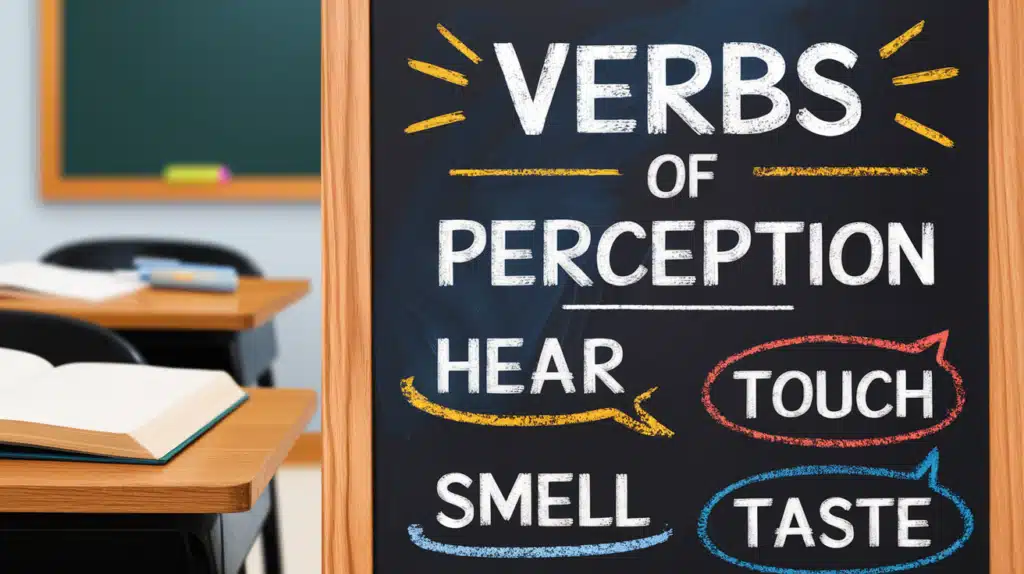Do you want to make your writing clearer and more powerful?
We know how hard it is to find the right words when describing what we see, hear, or feel.
Basic verbs like “see” and “hear” don’t always capture the full experience.
We’ll show you 75 verbs of perception that will help you describe sensory experiences in your writing.
In this post, we’ll share some amazing perception verbs for all five senses.
You’ll learn how to use them in sentences and when each works best.
Let’s make your writing more engaging!
Verbs of Perception for Sight

1. Gaze
Meaning: To look steadily and intently, especially in admiration or wonder
Examples:
- The child gazed at the stars through his telescope.
- She gazed at the old photos, lost in memories.
2. Peek
Meaning: To look quickly or secretly, often through a small space
Examples:
- The boy peeked through the window at the party inside.
- I peeked into the oven to check if the cake was ready.
3. Scan
Meaning: To look over something quickly to find specific information
Examples:
- He scanned the room for his missing keys.
- The teacher scanned the test papers for errors.
4. Study
Meaning: To look at something carefully and in detail
Examples:
- The scientist studied the cell samples under the microscope.
- I studied her face for any sign of recognition.
5. Watch
Meaning: To look at something continuously over time
Examples:
- The bird watcher watched the rare species from afar.
- She watched the sunset from her balcony.
6. Notice
Meaning: To become aware of something by seeing it
Examples:
- I noticed a small crack in the wall.
- He noticed her smile across the room.
7. Spot
Meaning: To see or notice something, especially suddenly
Examples:
- The hiker spotted a deer in the distance.
- She spotted her friend in the busy mall.
8. View
Meaning: To look at or examine something carefully
Examples:
- We viewed the city lights from the hilltop.
- The committee viewed the new building plans.
9. Inspect
Meaning: To look at something closely to check its quality or condition
Examples:
- The mechanic inspected the car’s engine.
- I inspected the fruit for any bruises.
10. Observe
Meaning: To watch carefully and attentively
Examples:
- The researcher observed the plant’s growth daily.
- She observed the children playing in the park.
11. Glance
Meaning: To take a brief, quick look
Examples:
- He glanced at his watch during the meeting.
- I glanced through the newspaper headlines.
12. Focus
Meaning: To direct your attention or sight clearly on something
Examples:
- The photographer focused on the distant mountain.
- She focused on the tiny details in her painting.
13. Glimpse
Meaning: To see something briefly or partially
Examples:
- I glimpsed a shooting star in the night sky.
- He glimpsed her walking past his office.
14. Eye
Meaning: To look at something carefully, often with suspicion or interest
Examples:
- The cat-eyed the fish in the pond.
- She eyed the last piece of cake.
15. Examine
Meaning: To look at or consider something in detail
Examples:
- The doctor examined the patient’s throat.
- I examined the contract before signing it.
Verbs of Perception for Sound

16. Listen
Meaning: To pay attention to sounds with the intention of hearing
Examples:
- The musician listened to the new song recording.
- I listened to the birds singing in my garden.
17. Hear
Meaning: To perceive sounds through the ears
Examples:
- We heard thunder in the distance.
- She heard footsteps coming up the stairs.
18. Overhear
Meaning: To hear something without the speaker’s knowledge
Examples:
- I overheard their conversation in the coffee shop.
- He overheard his parents planning his surprise party.
19. Catch
Meaning: To hear something faintly or partially
Examples:
- I caught bits of their whispered discussion.
- She caught the sound of music from next door.
20. Detect
Meaning: To notice or identify a sound, often faint or subtle
Examples:
- The mechanic detected an unusual noise in the engine.
- He detected a slight tremor in her voice.
21. Monitor
Meaning: To listen to something continuously to check its status
Examples:
- The nurse monitored the patient’s breathing.
- We monitored the radio signals for any changes.
22. Perceive
Meaning: To become aware of a sound through the senses
Examples:
- I perceived a slight rustling in the bushes.
- She perceived the change in his tone of voice.
23. Note
Meaning: To notice or pay attention to a sound
Examples:
- The teacher noted the increasing noise level.
- He noted the subtle change in the music.
24. Attend
Meaning: To listen carefully and give attention to sounds
Examples:
- The doctor attended to the patient’s heartbeat.
- She attended to the instructions on the phone.
25. Distinguish
Meaning: To recognize different sounds clearly
Examples:
- I could distinguish each instrument in the orchestra.
- He distinguished his mother’s voice in the crowd.
26. Register
Meaning: To become mentally aware of a sound
Examples:
- My ears registered the soft tap at the door.
- She registered the alarm going off downstairs.
27. Discern
Meaning: To identify or recognize sounds with effort
Examples:
- I could barely discern the words through the static.
- He discerned the sound of approaching footsteps.
28. Pick up
Meaning: To hear or detect a sound, often faint
Examples:
- The microphone picked up background noise.
- She picked up traces of an accent in his speech.
29. Recognize
Meaning: To identify a familiar sound
Examples:
- I recognized his laugh from across the room.
- She recognized the song from her childhood.
30. Track
Meaning: To follow or monitor a sound’s source
Examples:
- The hunter tracked the sound through the forest.
- We tracked the source of the strange noise.
Verbs of Perception for Smell

31. Smell
Meaning: To perceive an odor through the nose
Examples:
- The chef smelled each spice before adding it.
- She smelled smoke coming from the kitchen.
32. Sniff
Meaning: To draw air through the nose to detect a scent
Examples:
- The dog sniffed the ground for traces.
- I sniffed the milk to check if it was fresh.
33. Inhale
Meaning: To breathe in deeply to detect an aroma
Examples:
- She inhaled the fresh coffee aroma.
- He inhaled the scent of fresh-cut grass.
34. Scent
Meaning: To detect or identify by smell
Examples:
- The bear-scented honey in the distance.
- The dog scented a rabbit in the bushes.
35. Whiff
Meaning: To catch a brief smell of something
Examples:
- I caught a whiff of perfume as she passed.
- He got a whiff of garlic from the restaurant.
36. Sense
Meaning: To become aware of through smell
Examples:
- The cat sensed food in the kitchen.
- She sensed the fresh rain in the air.
37. Detect
Meaning: To notice or find a particular smell
Examples:
- The wine taster detected hints of oak.
- I detected a gas leak in the basement.
38. Breathe
Meaning: To take in air to experience a smell
Examples:
- We breathed in the fresh mountain air.
- She breathed in the scent of fresh flowers.
39. Sample
Meaning: To test or experience a smell briefly
Examples:
- The perfumer sampled the new fragrance.
- He sampled the aroma of fresh bread.
40. Notice
Meaning: To become aware of a smell
Examples:
- I noticed a strange smell in the car.
- She noticed the sweet scent of cookies baking.
41. Identify
Meaning: To recognize or name a specific smell
Examples:
- The expert identified each essential oil.
- She identified the source of the musty smell.
42. Trace
Meaning: To follow or find the source of a smell
Examples:
- The plumber traced the sewage smell.
- He traced the burning smell to the toaster.
43. Perceive
Meaning: To become aware of through the sense of smell
Examples:
- I perceived a slight hint of mint.
- She perceived the change in air quality.
44. Distinguish
Meaning: To recognize different smells
Examples:
- The chef could distinguish various spices.
- She distinguished between fresh and stale bread.
45. Recognize
Meaning: To identify a familiar smell
Examples:
- I recognized my mother’s perfume.
- He recognized the smell of rain coming.
Verbs of Perception for Taste

46. Taste
Meaning: To perceive flavor through the tongue and mouth
Examples:
- I tasted each sauce before serving.
- She tasted the soup to check the seasoning.
47. Savor
Meaning: To taste something slowly and fully appreciate it
Examples:
- He savored each bite of the chocolate.
- We savored the rich flavors of the wine.
48. Sample
Meaning: To taste a small amount to test quality
Examples:
- The chef sampled each dish before service.
- She sampled different types of cheese.
49. Sip
Meaning: To taste a liquid by drinking small amounts
Examples:
- I sipped the hot tea carefully.
- He sipped the soup from the spoon.
50. Nibble
Meaning: To taste by taking small bites
Examples:
- She nibbled the cookie to test its texture.
- The food critic nibbled each appetizer.
51. Experience
Meaning: To know a taste through direct contact
Examples:
- I experienced new flavors in Thai food.
- She experienced the bitterness of dark chocolate.
52. Detect
Meaning: To notice or find a particular taste
Examples:
- The wine taster detected notes of cherry.
- He detected a hint of cinnamon in the cake.
53. Distinguish
Meaning: To recognize different tastes
Examples:
- I can distinguish between sweet and sour.
- She distinguished various spices in the curry.
54. Sense
Meaning: To become aware of taste
Examples:
- I sensed something spicy in the sauce.
- He sensed the sweetness of honey.
55. Judge
Meaning: To evaluate taste quality
Examples:
- The expert judged each coffee blend.
- She judged the ripeness of the fruit.
56. Recognize
Meaning: To identify a familiar taste
Examples:
- I recognized my grandmother’s recipe.
- He recognized the taste of fresh mint.
57. Perceive
Meaning: To become aware of taste through the tongue
Examples:
- I perceived a subtle lemon flavor.
- She perceived the saltiness in the broth.
58. Test
Meaning: To check the taste of something
Examples:
- The cook tested the seasoning level.
- She tested the cake for doneness.
59. Examine
Meaning: To taste carefully to determine the quality
Examples:
- The chef examined each sauce component.
- He examined the wine’s finish and body.
60. Identify
Meaning: To recognize or name specific tastes
Examples:
- I identified all the ingredients in the dish.
- She identified the secret spice blend.
Verbs of Perception for Touch

61. Touch
Meaning: To feel something with your hands or skin
Examples:
- I touched the silk fabric gently.
- She touched the surface to check its temperature.
62. Feel
Meaning: To perceive through physical contact
Examples:
- I felt the smoothness of the marble.
- He felt the rough texture of tree bark.
63. Stroke
Meaning: To move your hand gently over a surface
Examples:
- The artist stroked the canvas with care.
- She stroked the cat’s soft fur.
64. Pat
Meaning: To touch lightly and repeatedly
Examples:
- I patted the dough into shape.
- He patted the soil around the plant.
65. Brush
Meaning: To touch lightly while moving past
Examples:
- The leaves brushed against my face.
- She brushed her fingers across the keys.
66. Press
Meaning: To push against something with force
Examples:
- I pressed the doorbell firmly.
- He pressed his hand against the glass.
67. Grip
Meaning: To hold something firmly
Examples:
- I gripped the rope tightly.
- She gripped the steering wheel.
68. Handle
Meaning: To touch, hold, or move with your hands
Examples:
- The curator handled the artifacts with care.
- He handled the fragile glass carefully.
69. Grasp
Meaning: To take and hold something firmly
Examples:
- I grasped the handrail for support.
- She grasped the pencil between her fingers.
70. Rub
Meaning: To move your hand back and forth on a surface
Examples:
- I rubbed the wood to feel its grain.
- He rubbed his eyes from tiredness.
71. Trace
Meaning: To follow the outline of something with your finger
Examples:
- I traced the pattern on the wall.
- She traced the letters with her finger.
72. Tap
Meaning: To touch something lightly and quickly
Examples:
- I tapped the screen to wake it up.
- He tapped his fingers on the table.
73. Hold
Meaning: To keep something in your hands
Examples:
- I held the warm cup of tea.
- She held the baby’s tiny hand.
74. Squeeze
Meaning: To press something firmly
Examples:
- I squeezed the orange juice.
- He squeezed her hand in support.
75. Test
Meaning: To check something by touching it
Examples:
- I tested the water temperature.
- She tested the fabric’s thickness.
Conclusion
Now, you have 75 powerful verbs of perception to help you describe what your characters see, hear, smell, taste, and touch.
These words will help you paint clearer pictures in your readers’ minds.
Each one adds its own special touch to your writing. When you use them, your stories and descriptions will feel more real and alive to your readers.
Try picking one verb from each sense group and use it in your next piece of writing.
You’ll see how these small word changes can make your writing more engaging.

















